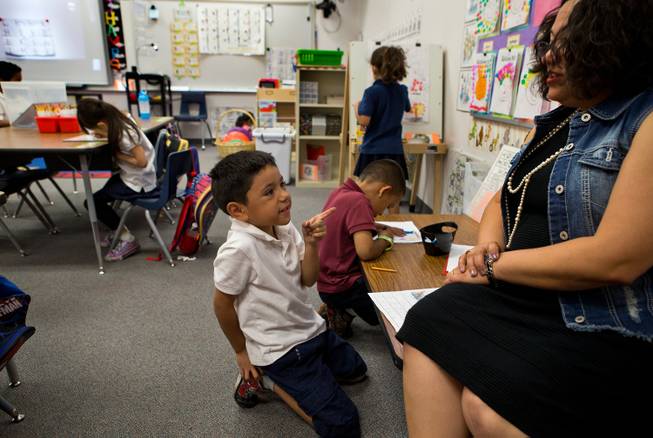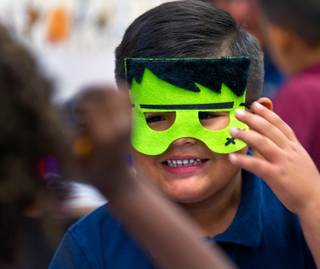
Kindergarten teacher Raeleen Martinez works with her students as they rotate through literacy stations at Martinez Elementary School, Tuesday, Oct. 7, 2014.
Thursday, Oct. 23, 2014 | 2 a.m.
The kindergartners walk into Raeleen Martinez’s classroom and begin digging through their superhero and princess backpacks for their reading booklets.
Martinez’s sing-song voice and perpetual smile welcome them to her class at Martinez Elementary School and get them started on their first activity, reading the booklet, “I Like Salad.” She tells them to read the words they know.
The boys and girls seated at their group tables know the routine. They flip through pages with pictures of tomatoes and celery that they’ve scribbled over with crayon. They read, “I like tomatoes,” and “I like celery.” They must be able to understand such basic words by the end of the year.
“I see the way Erin is reading and Juan is reading,” Martinez says. Then she adds a phrase she repeats throughout the day to keep the children focused: “Remember, we don’t like to waste time.”
On the whiteboard, the day’s lessons are already mapped out from arrival to dismissal. They have the four letters of the week, alphabet songs with dancing, counting exercises and work stations. The only break is lunch.
Martinez tries to keep the class moving, mixing lessons with games, dancing, crafts and songs to keep them hooked. But every moment corresponds to a state assessment standard, which she keeps in a shelf of 2-inch binders behind her work table.
Today’s kindergarten is more than just day care with a little learning. Under the Nevada Academic Content Standards, more is expected from children at a younger age. Those expectations have placed an even greater importance on the lessons learned in kindergarten.
“It’s not just playing anymore,” Martinez said. “It’s play with purpose.”
• • •
Martinez spends one to five hours each day after class preparing the lesson plans for her students.
She teaches a full-day kindergarten class with a high population of English Language Learners. Each lesson must reach kids at different levels of knowledge. Some know how to read, while others are just learning their letters.
A lot has changed since Martinez started teaching kindergarten 19 years ago. In the past, it used to be enough for children to practice structured play, learn their letters and write their name. Under the new standards adopted four years ago, students must be able to read 50 basic words, such as “you,” “she” and “me,” count to 100, do basic math, understand letter sounds, count syllables, write sentences and much more.
It’s a lot of pressure, Martinez said. She also has to file two grades each day to keep parents updated on their child’s abilities. Sometimes those assessments don’t reflect the growth she sees in kids as they learn a letter or how to write a word. Still, she’s also seen children grow more under the new standards.
“Kindergarten is the most difficult job I’ve ever had,” said Martinez, who has taught other grades in both public and private school. “But it’s by far the most rewarding.”
While the standards are more difficult, Clark County School District academic manager Danielle Miller said the children are up for the challenge.
With advancements in technology, more preschool opportunities and educational shows such as “Sesame Street,” more kids are coming in at 5 years old ready to learn, Miller said. By the time they finish kindergarten, parents are often shocked that their child can read, write and do basic math on top of all the other social skills kindergarten teaches.
That knowledge then forms a deeper foundation that prepares the child for the rest of his or her academic career, Miller said. By expecting more from kindergartners, the more the students are prepared for the higher standards that await them.
“I think every parent sends their children to kindergarten so they can become readers and writers,” Miller said.
• • •
When Becky Mersereau first saw what her twin boys were expected to learn in kindergarten, she felt a little overwhelmed.
She knew her twin boys were ready for school when they entered kindergarten at O’Roarke Elementary School, but the standards seemed like a lot. At the time, her boys couldn’t read more than 10 words or write.
By the time they exited, their teacher, Laura Fischer, had them writing three-sentence paragraphs. They could read and recognize 300 words, count to 100 and add. Mersereau said part of her children’s success came because Fischer never wasted a teaching moment and expected a lot from the children.
But Mersereau also read to her kids every night and spent an hour with them after school on areas in which they needed improvement.
“I think the rigor that is expected in kids today is good,” Mersereau said. “I’m a believer that if we raise expectations, our teachers and kids are going to achieve the expectations.”
Now that her boys are in third grade, one is a straight A student and the other receives mostly A's.
“Without kindergarten, they would be completely lost. The foundations they were given in kindergarten are irreplaceable.”
• • •
It’s almost lunchtime, and Martinez is bouncing around the classroom from group to group like a pinball while a timer counts down from five minutes.
Her kids are in stations, each reinforcing a different standard. This is the last five-minute rotation before lunch. Some are making a painting while practicing how to write their names, another group is listening to an audio book, and two others are wearing Frankenstein glasses while practicing a writing activity.
Martinez stops by each group often to see whether they understand what they’re learning. She watches children write their name for the first time, read basic words and count syllables.
Every moment is a call for celebration. She gives them high-fives for each right answer and often tells groups to “Kiss your heads” after a right answer. The kids respond by bringing their fingertips to their lips and then touching them to their foreheads. They love it, jumping up and down and smiling when they get a right answer.
These celebrations are important, Martinez said. They are the moments the “lightbulb goes off,” and it makes them want to learn, even if they struggle on a topic.
When the timer buzzes, the kids know it's time to put their activities away.
“Remember, stopping is as important as starting,” Martinez says in her sing-song voice.
In kindergarten, there is no time to waste.
“Everybody has to leave growing,” Martinez said. “I don’t know how much everybody is going to grow by the end, but everybody grows.”


Join the Discussion:
Check this out for a full explanation of our conversion to the LiveFyre commenting system and instructions on how to sign up for an account.
Full comments policy